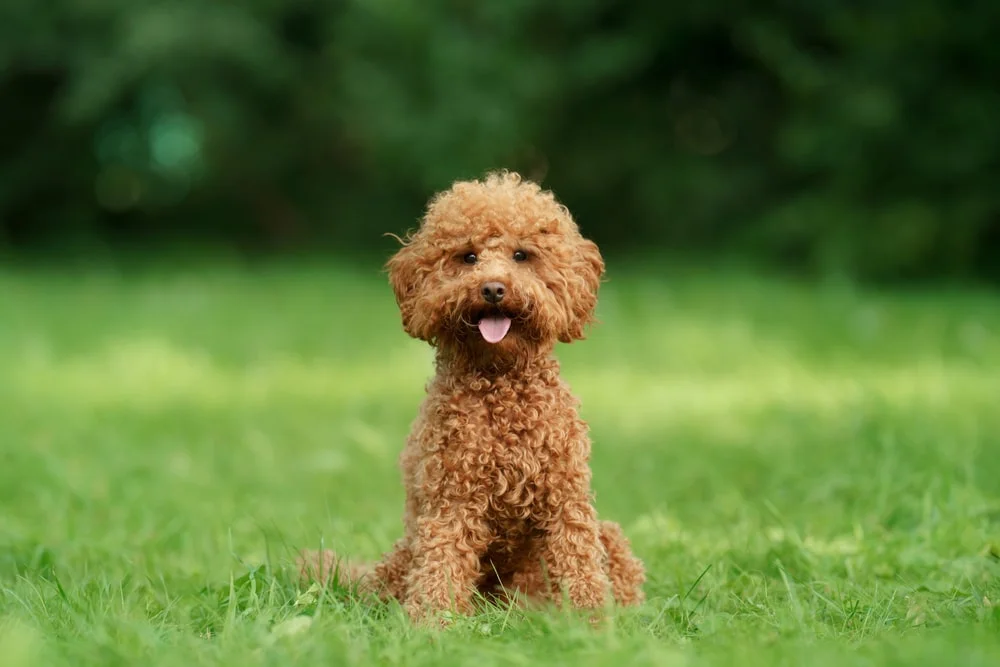BREED SPOTLIGHT
Breed Spotlight: Standard Poodle
What Are Some Facts About Poodle?
LIFESPAN:
10-18 years
WEIGHT:
40-70 lbs.
HEIGHT:
Over 15 inches
DO I SHED?:
Minimally
Personality:
affectionate, kid-friendly, intelligent, easy to train
Health problems:
shaker syndrome, epilepsy, patellar luxation, portosystemic shunt
Poodle: How Do I Look?
When most folks close their eyes and think of “poodle,” a lanky, poofy-tailed dog is usually what they’re thinking about. The average standard poodle size is over 15 inches tall, usually maxing out at 24 inches. Females weigh between 40 to 50 pounds while males weigh 60 to 70 pounds.³
Poodles are athletic and highly intelligent dogs with a lifespan of up to 18 years. They love people and other pets equally. This breed enjoys swimming and playing with their favorite humans, so if you’re looking for a beautiful, low-shedding dog, a poodle may be for you.
Coat type and colors
Poodle coats are long and curly that come in a wide variety of colors, often with white and black mask-like markings around the eyes and mouth. Some of the official colors for poodles are:³
- White
- Silver
- Beige
- Red
- Gray
- Cream
- Brown
- Blue
- Black
- Apricot
Shedding and grooming
Poodles are very high-maintenance dogs. A poodle’s curly hair is prone to matting at the root without daily brushings and regular trims.³ Many pet parents keep their poodle’s coat short because they want to avoid matting, so be prepared by investing in a good set of grooming tools like shears, brushes, and nail trimmers if you want to do it at home. Otherwise, you’ll have to bring your pup to the groomer for regular trims.
Are poodles hypoallergenic?
While no dog is truly hypoallergenic, poodles are considered by many to be hypoallergenic dogs because they don’t shed as much as many other dogs. A poodle’s coat is a single layer of curly and long hair, so they don’t shed like double-coated breeds that release the oils and dandruff that cause allergies. Whether it's the standard, miniature, or toy variety of poodle, this breed can be a great option for allergy sufferers who want an athletic dog as a companion.
Ears
Similar to other dogs with long coats, poodle ears are covered with fur that prevents regular airflow into the air canal, so pet parents should get their poodles comfortable with having their ears handled. Regular cleanings with veterinarian-recommended ear cleaners can help you avoid costly ear infections caused by debris, bacteria, and fungi.⁴
Drooling level
Poodles aren’t known for drooling. If your poodle is drooling excessively, they may simply be excited about their meal! If no food is in sight, excessive drooling may be a symptom of periodontal disease or related dental issues.
Poodle Adult: Personality Traits
What My Adoption Bio Would Say:
I’m a combination of beauty, brains, and brawn looking for a family who’ll love to play. Swimming and running are my favorite hobbies, so I hope you can keep up because I’m active and ready for my forever family!
Behavior
The poodle is valued for their loyalty, loving nature, and intelligence. This breed is very protective of their family and it may take a while for them to warm up to strangers. Poodles are eager to please and, when combined with their smarts, they make excellent show or sporting dogs. However, this may not be a good animal to have for busy pet parents because a poodle needs frequent attention or it may result in behavior problems.
Trainability
Originally bred to fetch waterfowl for 20th century European hunters, pet parents should find their poodle easy to train. Once you get basic commands down, then you can move on to fun activities. Poodles, like other water retrievers, enjoy playing fetch or solving puzzles.
Exercise needs
Pet parents should expect to spend up to an hour a day exercising their poodle to keep their bodies and minds healthy. This can look like a combination of walks, retrieval games, or playing with kids in the backyard. As long as you spend the time, your poodle will reward you with loads of affection.
Good with kids?
Poodles are great family pets because of how easy they are to train and their desire to please. If you’re looking for a beautiful dog that your kids will love, then you’ve found the right breed.
Good with other pets?
Most poodles get along well with other pets, however early socialization with other animals is recommended so your pup sees the other pets as part of the pack. Sometimes poodles become territorial of their pet parents, which can cause tension between the pets in the home if a new furry family member is introduced. Make sure to take the time to play with your poodle so your pup knows they are loved and there is no reason to fuss when a new pet is taken home.
Barking level
Poodles can be very vocal dogs, known for barking when strangers approach that pass by, at squirrels on the window, or your friendly elderly neighbor. Early training and socialization (and a healthy dose of patience) are needed to train your poodle when barking is appropriate.
Poodle: A History
Even though this popular dog is associated with the French, poodles were bred for duck hunters in Germany.³ Their beautiful coats were designed to repel water, like other water retriever dogs, while their intelligent puppies were bred to make a trustworthy hunting partner.
Today, poodles are associated with luxury and wealth because the French nobles adopted the dog as a show dog.³ As a result, poodles can be found in three varieties: a miniature poodle, a toy poodle, and the standard poodle. Miniature poodles are under 15 inches while toy poodles are less than 10 inches tall.³ All these poodles are active animals with muscular builds and witty personalities.
Common Poodle Mixes
There are dozens of poodle hybrids out there. Breeders quickly learned to take advantage of a standard poodle’s personality and coat type. Here are some to consider if you’re looking for a mixed breed hypoallergenic dog. As a general rule of thumb, if you see a breed name with the word “poo” or “doodle” in it, it’s mixed with a poodle.
- Cavapoo: A cross between a Cavalier King Charles spaniel and a poodle.
- Shih Poo: A cross between a shih tzu and a poodle.
- Labradoodle: A cross between a labrador retriever and a poodle.
- Goldendoodle: A cross between a golden retriever and a poodle.
- Yorkie Poo: A cross between a Yorkshire terrier and a poodle.
It’s important to take your new pup to the vet, especially with designer dogs like the ones on the list. Most of these dogs aren’t recognized by the American Kennel Club so do your homework or you may find yourself with thousands of dollars of veterinary bills treating genetic disorders.
Poodle Health Issues
Responsible poodle breeders will screen their dogs for a host of genetic disorders, but it’s important to know what sorts of health problems your poodle could develop. Poodles are generally healthy dogs, but as they age they can develop disease like:
- Addison’s Disease: Also known as hypoadrenocorticism, this is a severe health condition which is caused by insufficient production of adrenal hormones.
- Cushing’s Disease: This condition causes the adrenal glands to overproduce certain hormones like cortisol which manage stress and other critical body functions.⁵
- Hip Dysplasia
- Epilepsy: This is a genetic disorder that causes repeated seizures.⁶
- Bloat: Formally known as gastric dilatation and volvulus, this is when a large amount of gas forms in the dog’s stomach or the stomach twists onto itself, which can be deadly.
- Allergies
- Cancer
- Hemophilia (A & B): This blood disorder prevents blood from clotting properly. Bruising and joint pain are also common symptoms.⁷
- Von Willebrand’s Disease: Similar to hemophilia, this is a genetic disorder where the vWD gene is missing which causes the blood not to clot.
- Cataracts
You should work closely with your breeder to find out the family history of your poodle. If you choose to adopt, you may want to get genetic testing to find out what diseases you may have to look out for.
Protect your Pets
Even the healthiest of pups can come with unexpected vet costs. Pet insurance can help keep your dog and your bank account happy.
How Pet Insurance Can Help Poodle
Bloat
Bloat tends to affect large dog breeds with deep chests, like poodles and German shepherds.⁸ Also called gastric dilatation and volvulus (or GDV), bloat happens when the stomach twists on its axis causing food, fluid, and gas to get into the stomach. Symptoms include restlessness, discomfort, drooling, shortness of breath, and repeated dry heaving.
Bloat requires immediate medical attention. Vets will have to conduct surgery to either drain the stomach and put it back in place. Luckily, with the way pet insurance works, emergency surgeries and all care afterwards are often covered.
Poodles are great pets for folks who need an active dog whose loyalty stands the test of time. They are hypoallergenic dogs for humans prone to sneezing. Just like humans, poodles can and do get sick. Whether it’s genetic disorders like Addison’s disease or common issues like hip dysplasia, MetLife’s dog insurance policies can help you take care of your pet..1,2
Consider investing in a pet insurance policy with MetLife to help protect your best friend.






